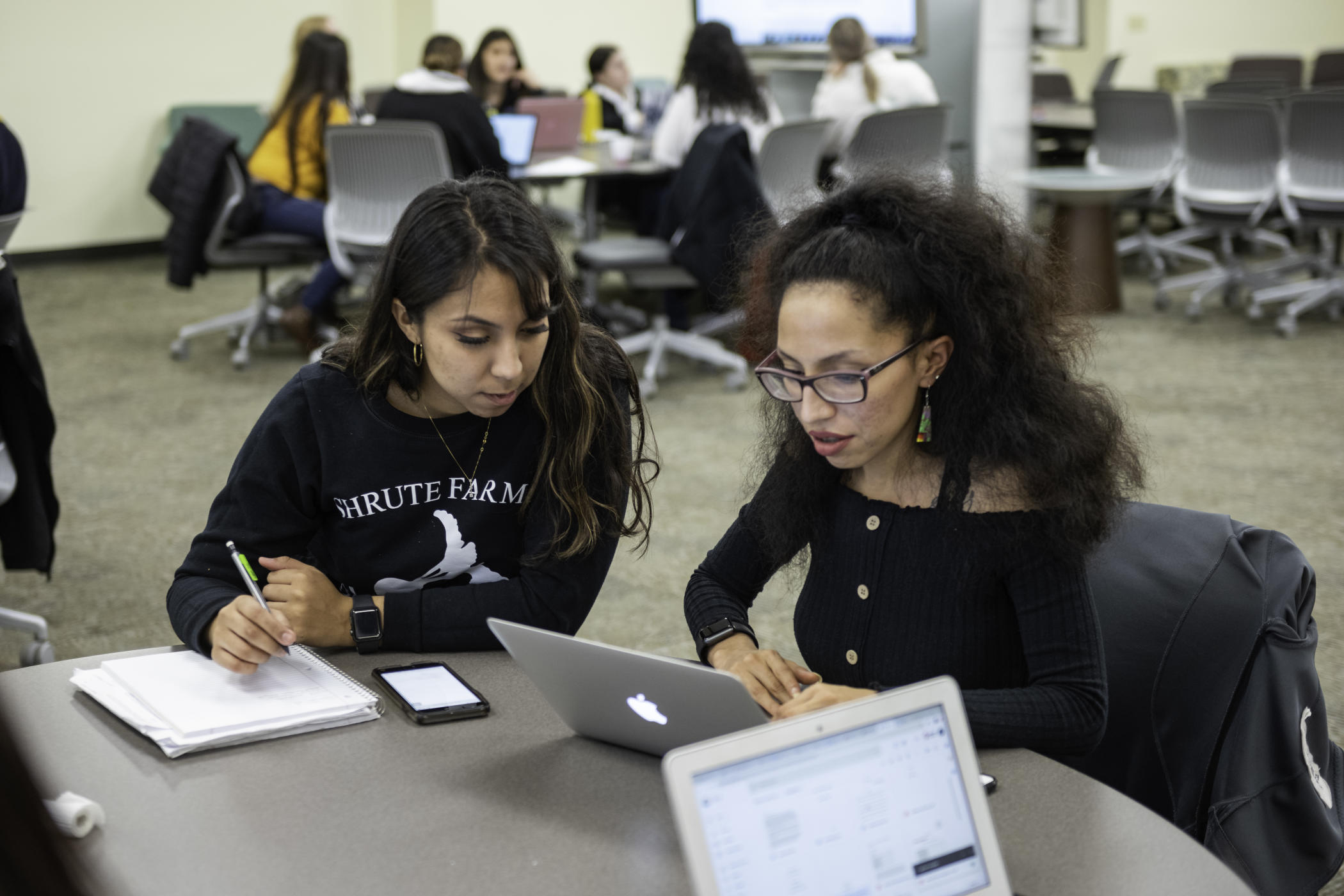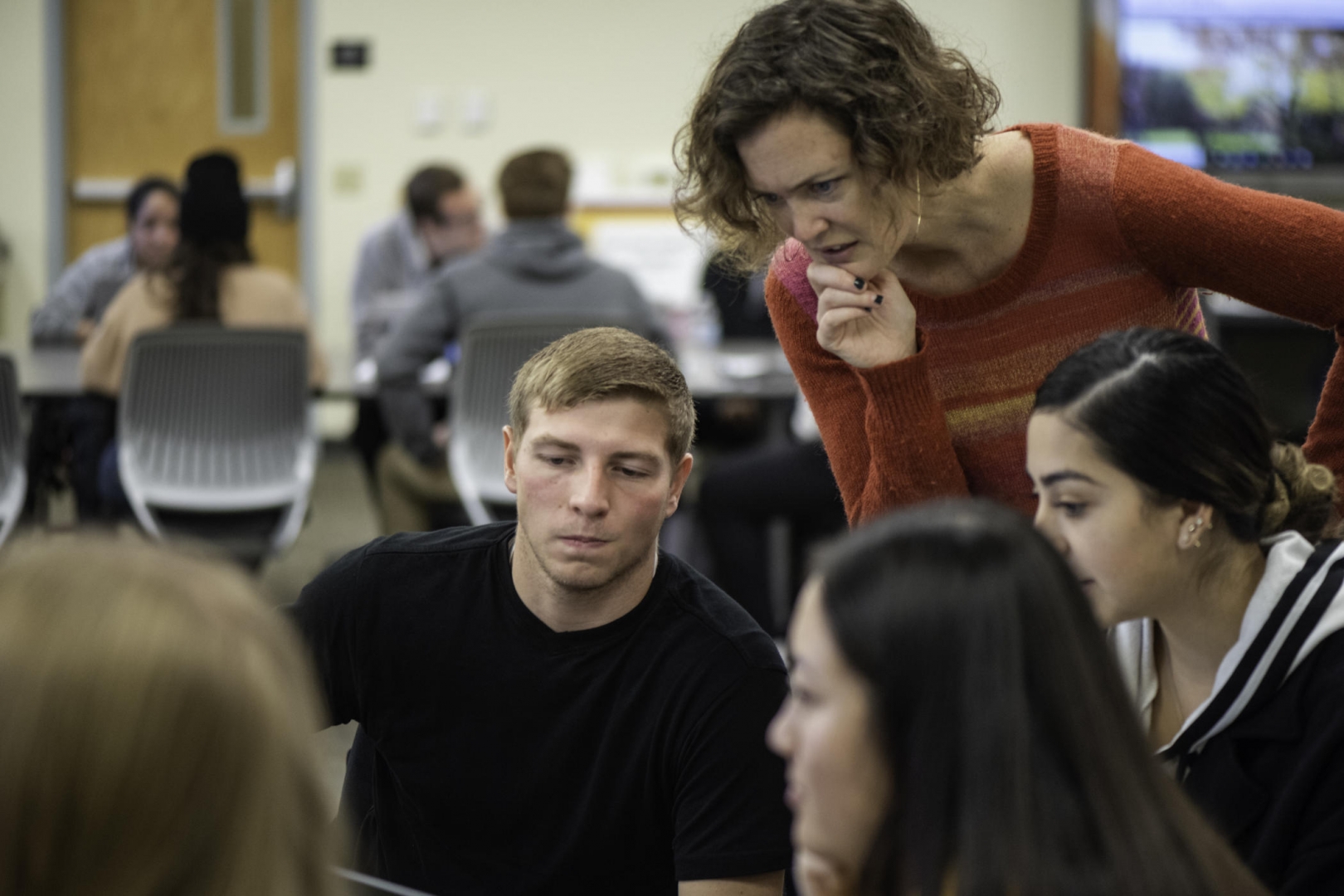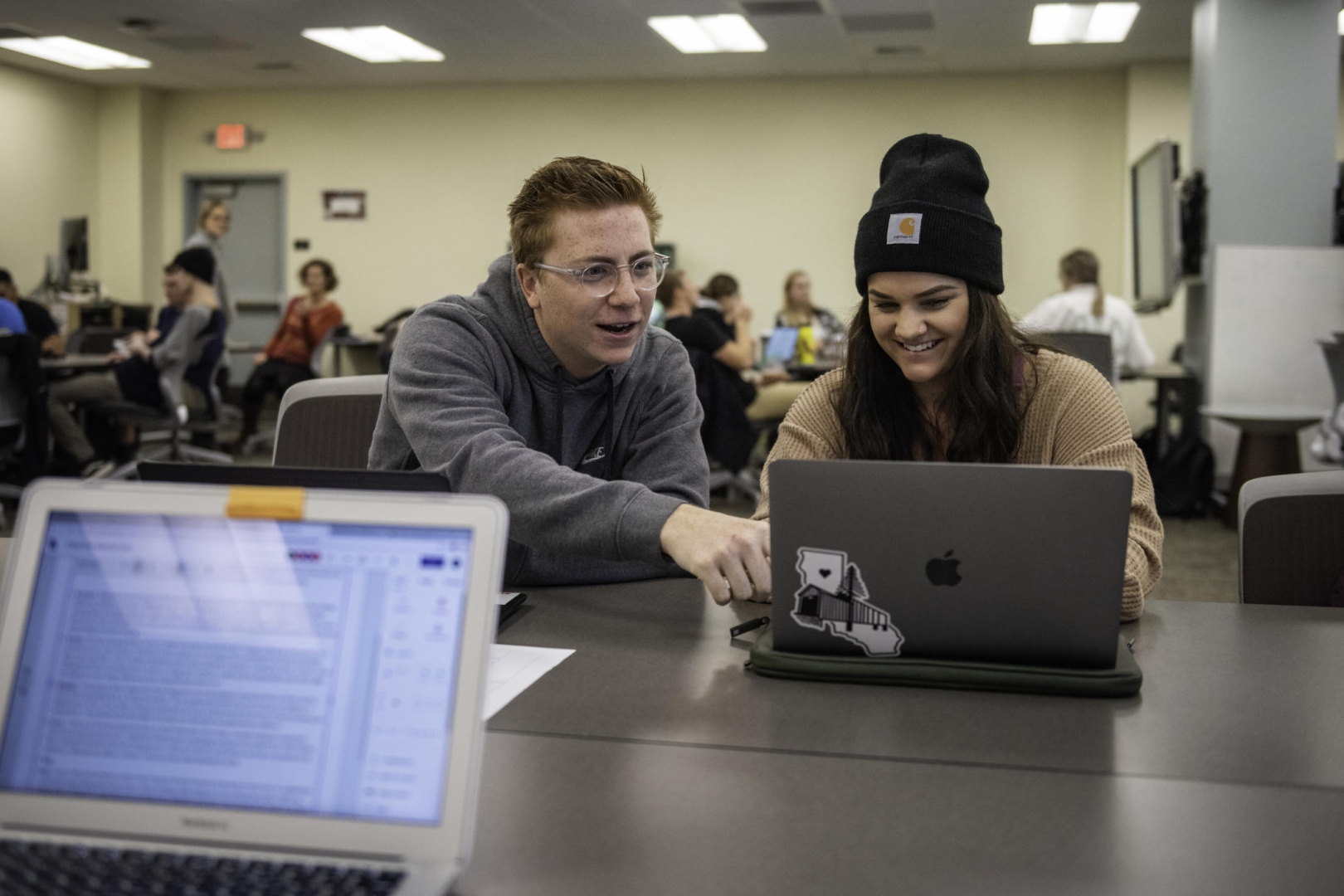Student Teams Work to Alleviate Housing Insecurity

Liza Morfin (left), Tatiana Ybarra (right) and students work on research informs policy to Alleviate Housing Insecurity at the local level in a multidisciplinary courses, Capstone in Psychology (PSYC 401), Intro to Research Methods (POLS 331), Soc Welfare Policy/Progs/Svcs (SWRK 485), on Thursday, December 5, 2019 in Chico, Calif. (Jason Halley/University Photographer/CSU, Chico)
For the last 15 weeks, dozens of students have blended their knowledge in social work, criminal justice, and political science to tackle one of society’s most pressing problems—homelessness.
Their goal: Develop a series of partnerships and policies that can be adopted by the campus and greater Chico community to find solutions for students facing housing insecurity, people displaced by the Camp Fire, and generally unsheltered individuals.
“This is not a one-solution problem at all,” said senior Amber Benedict, who is majoring in social work. “There is no right or wrong. We are talking about people, human beings. There are so many layers to this problem, it will take multiple approaches to find a solution.”
This Friday, she and fellow students in the “Interdisciplinary Course on Research and Policy” will hold an open house from 10 a.m. to 1 p.m. in Tehama Hall, Room 116, to share their creative concepts for partnerships that address this tough problem. Their hope is advocates and people in positions of power will take their ideas and drive them forward.
“Even if it just continues the conversation, that would be a win for me. It’s an issue not just for Chico but for California,” Benedict said.
The semester-long class cotaught by professors Susan Roll and Jennifer Wilking blends social work students studying policy with political science and criminal justice students studying research to design a campus-community partnership that can alleviate housing insecurity.
A starting point was to assess the pervasiveness of homelessness. The California State University 2018 Study of Student Basic Needs reported that 3.3% of Chico State students—an estimated 500 students—experience homelessness or displacement during the academic year. Additionally, the 2019 Butte County bi-annual Point-in-Time Count identified 2,304 adults and children experiencing homelessness countywide, noting that the actual number is estimated to be higher.
Throughout the fall, the students continued their research by looking at demographic data, case studies, and an examination of how other campuses are addressing housing insecurity. They augmented their findings with presentations by experts on student housing insecurity, as well as community leaders who spoke to intersecting opportunities for the campus and community, as well as innovative solutions and responses to homelessness.

The class culminates with the development of proposals for campus-community partnerships that target particular groups experiencing homelessness. Senior Julianne Lash’s group concluded that the Blackboard learning management system could be a great tool to support students with housing insecurity. As an existing platform that students already use, it could connect them with resources, collect data, and raise overall awareness to decrease stigma.
As an example, Lash said she continues to be amazed by students who don’t know the Hungry Wildcat Food Pantry exists. The pantry would be among many resources that could have a greater presence in Blackboard, along with information about how to apply for food assistance programs like CalFresh, access services at local homeless shelters, and find affordable housing, the social work major said.
Tatiana Ybarra, a junior criminal justice major, added that a survey component would be a critical piece of the solution, to know not only how many students are on the brink of homelessness or struggling with housing insecurity, but what would help them and how their needs change over time.
“A lot of people are assuming what students need—and those students don’t tell us because there is a stigma and shame. They don’t feel like they can have a voice,” Ybarra said, adding that policies that spotlight the prevalence of homelessness can help change attitudes.
In looking for solutions for the broader unsheltered community, senior Ryan Elkins, a criminal justice major, and his group ultimately drafted a policy where students from different departments across campus could provide an array of services. The art department could do art therapy, nursing students can provide flu shots and wound care, kinesiology would host yoga and mindfulness classes, political science can connect individuals with legal services—the list goes on and on.
Benedict’s team developed a similar proposal, taking it a step further by incorporating such activities into graduation requirements, so that different majors must complete a certain quantity of volunteer hours in the community. The University’s involvement must be part of any solution, the students agreed.

“Bringing in school resources shows we do care,” Elkins said, “that we are true to what we are saying, that this is an issue that hits home for everyone.”
It certainly did for Lash. Her father, who passed away two years ago, had personally experienced homelessness. That direct connection is part of what drives her desired career in social work but also lent a unique perspective she shared with the class to humanize homelessness for students whose backgrounds and experiences around homelessness were more limited.
The interdisciplinary nature of this course was especially meaningful to the students, who agreed it gave them a chance to work with others who represent a different perspective and expertise to take a deep dive into a topic that will be part of their careers.
For Ybarra, who aspires to become a district attorney one day, the lessons she learned this semester will only complement the rest of her coursework, she said.
Elkins said the dedication of his peers toward a higher purpose gives him hope for a solution, and he and many of his classmates hope members of University administration will attend Friday’s presentation to see the ways Chico State can be a better partner. It won’t come immediately, but progress starts with a single step—in this case, beginning to identify potential partnerships and policy remedies.
“Any little bit we can get the ball rolling in the direction of change, that matters,” Elkins said. “I just try to do the best I can every day.”


